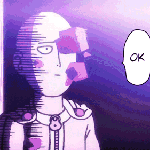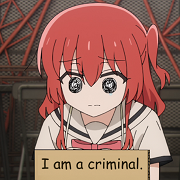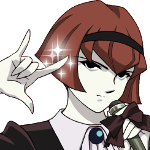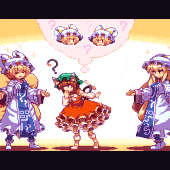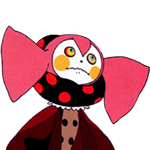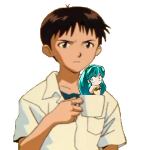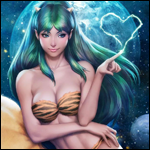|
I mean, the thing is that it looks like a deconstruction if you've never seen an actual Magical Girl show. It's not so much deconstructing it as it is following in the same steps and putting it right in your face.
|
|
|
|

|
| # ? Apr 19, 2024 08:22 |
|
Twiddy posted:Broken down and read it, it's good. A deconstruction is, as far as I know, not specifically defined by any real authority. The commonly proposed definition is that a deconstruction takes a genre or type of story's tropes to their logical or realistic conclusions. The problem is that Magical Girl shows have been "getting real" or "going dark" pretty often. Madoka doesn't take those tropes to their logical conclusion, or even really do anything new. It just does, all at once, what a lot of shows have done before, and does it really well. I think that many people consider the original TV series of Evangelion to be a deconstruction of the Super Robot genre (though it kinda straddles the line between Super and Real Robot). Gurren Lagann is often considered a "reconstruction," taking the old tropes and playing them straight in every possible way.
|
|
|
|
PerrineClostermann posted:A deconstruction is, as far as I know, not specifically defined by any real authority. The commonly proposed definition is that a deconstruction takes a genre or type of story's tropes to their logical or realistic conclusions. no that's what it doesn't mean https://en.wikipedia.org/wiki/Deconstruction
|
|
|
|
PerrineClostermann posted:I think that many people consider the original TV series of Evangelion to be a deconstruction of the Super Robot genre (though it kinda straddles the line between Super and Real Robot). Gurren Lagann is often considered a "reconstruction," taking the old tropes and playing them straight in every possible way. uh what the gently caress
|
|
|
|
to hopefully further head this off, and for something slightly less dry, i highly recommend https://rosesturnblog.wordpress.com/2014/11/20/fandom-deconstruction-and-puella-magi-madoka-magica/comment-page-1/ a work i read as i was doing some post movie reading it not only talks about what it is, it also speaks on what it isn't, and points out examples present in other shows and even semi present in other shows
|
|
|
|
Cake Attack posted:no that's what it doesn't mean Ah. Well, it's not entirely off base then. Taking a trope to its logical conclusion does help you examine it and understand its meaning. I'm certainly surprised, though. I could have sworn I'd looked this up before. I can't imagine I'd miss an entire huge Wikipedia article about it, though. Thanks. The Colonel posted:uh I guess replace "most people" with "I've heard people talking and saying this but apparently it's really off base and said by people without any idea what they're really talking about"
|
|
|
|
Please Do Not Go To TvTropes Dot Com
|
|
|
|
slowly climbs atop a table and cups hands around mouth DECONSTRUCTION!
|
|
|
|
Tarranon posted:Please Do Not Go To TvTropes Dot Com A quick look at TV Tropes seems to concur with the wikipedia page... I'm gonna admit though, both pages look pretty drat long and I didn't do more than glance at 'em.
|
|
|
|
Don't worry friends, I shall solve your internet argument about the application of Jacques Derrida's theories of literary criticism as applied to magic girl anime. It's about being smug, evasive, and ripping on something somebody likes. So imagine me, but french, and a tenured professor of philosophy. see that seafood I didn't even use the magic word
|
|
|
|
Tarranon posted:to hopefully further head this off, and for something slightly less dry, i highly recommend I was reading the blog post linked to in that blog post that talks about how it's human nature to hope amidst great despair, but is that really the case? I wouldn't be surprised if only a small minority of people actually continue to hope when faced with true despair. It's easy for someone with a normal life to imagine themselves being filled with hope and resisting a terrible situation, but in real life it seems like the stress/pain would just rob most people of the energy to resist their lot in life.
|
|
|
|
Well, I think it's absolutely human nature to struggle to survive. Even in a 'hopeless' situation, most people won't simply roll over and wait to die. Now, does trying to survive in a 'hopeless' situation imply hope? I think you could say that and get away with it. But surviving has problems of its own. Sometimes people get so caught up with just getting through the day that they don't actually take the steps they could take to make their situations less desperate. Does that mean they're hopeless? You could probably make a good case for that too!
Tarranon fucked around with this message at 08:19 on Jan 11, 2016 |
|
|
|
Tarranon posted:Good stuff. That was quite an interesting read, my thanks for the effort. I don't feel I have much to add at the moment, but I would add a recommendation. If possible, I would advise watching Rebellion at least in the original Japanese with subs. While the English dub is passable (and still subpar to the original Japanese) in Beginnings and Eternal, Rebellion takes a serious nosedive in quality, both in delivery and translation. I honestly don't consider English dub Rebellion to be Rebellion, it just... Kind of looks like it. As well, it would be a shame to miss out on the masterful work put forward by the Japanese cast, Chiwa Saito (Homura) and Aoi Yuuki (Madoka) especially are masters of the craft. Ytlaya posted:To be honest, I think Madoka/Rebellion are simultaneously complex enough to warrant significant analysis, while also simple enough that they don't require too much thought to understand (I don't think I've read a single analysis that didn't immediately make sense, while I had to put more effort into just understanding some of the literary analysis I encountered in college, and this was only in low level courses since I wasn't a liberal arts major). Actually, part of my understanding of Madoka's idealism is based on the work Urobuchi wrote that led in part to the genesis of Madoka, Fate/Zero. There, Urobuchi spent a lot of time dismantling the kind of idealism Madoka herself espouses, such as in the Grail Dialogue between Iskandar and Arturia. You can actually create a sort of interesting conversation between Madoka and Fate/Zero if you put the two together: Arturia: "A King would willingly die for his ideals." Iskandar: "That is not how a person should live." Arturia: "If I rule a country as its king, I cannot hope to live as a person." Iskandar: "Saber. you said you would die for your ideals. In life, you must have been a pure and honest saint. A noble and inviolable figure, certainly. But who on Earth admires the martyr's thorny path? Who dreams of such a life?" Homura: "Magical Girls must continue always to fight. That was the price we paid for our miracles. It's because our fate is what it is that she gave up everything to save us. This ridiculous farce is just wasting the sacrifice that Madoka made for us. I won't allow it." Iskandar: "Proud King of Knights. The righteousness and ideals you bore may have saved your country once. However...I'm sure you know what happened to those were constantly and only saved. You saved your subjects, but you never led them. You never showed them what a king should be. You abandoned your men when they lost their way. Alone and untroubled, you followed your own pretty little ideals. Thus, you are no true king. You are but a little girl, bound by the false idol of a king who serves others but not himself." Madoka: "Homura-chan, don't! You'll rip me apart!" Homura: "I told you, Madoka. I'll never let you go again." Iskandar: "Little girl, wake up from that sad dream of yours. The dream of the kingship you spoke of is a curse." Essentially, replace the ideal of a kingship with the ideal of Magical Girls held by Madoka, and I'm sure you can see the relation here. Urobuchi isn't shy about addressing a person's idealism, and I'm hoping Madoka will get a similar treatment as Saber got in the Grail Dialogue at some point in the future. It feels to me like Rebellion has set this up, for the question to be asked of Madoka's idealism. Time will tell, I suppose. Blaziken386 posted:Dies, yet goes to magical girl valhalla. When we see her again in Rebellion, it's shown to be a very good thing for her, because she's much more mature & emotionally healthy. She's shown to have conquered her inner demons in a very literal sense, given that she can use Octavia's powers at will. The issue with this maturity is that it really does nothing to help Sayaka. Yes, she gets over Kyousuke, makes up with Kyouko, etc. But for what? She's still dead. She can't interact with them anymore, and she can't grow up. While Sayaka may have a point with being forcibly ripped from the Law of Cycles without her consent, she's also acting incredibly self-righteous towards Homura. Homura, unlike Madoka, seems unwilling to sacrifice Sayaka on the altar of her toxic idealism. She gave Sayaka a second chance fro her to mature properly as a person living in the world, and managed it without negating her wish. And Sayaka spits in her face and calls her a demon. This is sort of the problem, Sayaka is inherently self-destructive and selfish in this sense. She doesn't seem to spend any time thinking about how people will react to her death. What about her parents? Her friends? How did Hitomi react, did she blame herself? How badly did Sayaka's death impact her relationship with Kyousuke? How does Kyousuke feel about his childhood friend dying? Etc Etc. Sayaka doesn't exist in a vacuum. Her death is going to hurt a lot of people. She really shouldn't be so geared to destroy herself over some ideal of a "higher existence". Homura may not have done right to Sayaka, but she did right to everyone around her. Ytlaya posted:I think the music is like 80% of why people find it memorable. Yuki Kajiura's music all sounds the same, but it's still very good at setting the tone/emotion of scenes. That combined with the fact that the pacing/animation/story are all done very well (mostly in the sense that there are almost zero problems to speak of) makes it leave a bigger impression on viewers, even if there's nothing profound about the plot. After having listened extensively to the Madoka OST, the Fate/Zero OST, and the Kara no Kyoukai OST, I take issue with Yuki Kajiura's music all sounding the same. She uses similar motifs in places, but each soundtrack has a very distinct feel and sound to it. Madoka is very "magical", Fate/Zero is equal parts "devious" and "militaristic", and Kara no Kyoukai is full of regret and wistfulness. Lord Justice fucked around with this message at 08:18 on Jan 11, 2016 |
|
|
|
we couldn't even make it four pages without people breaking one of the like two rules
|
|
|
|
Gyra_Solune posted:we couldn't even make it four pages without people breaking one of the like two rules Someone was probated on page one.
|
|
|
|
PerrineClostermann posted:Someone was probated on page one. yeah, but littleorv was loving around on purpose
|
|
|
|
Noted troll littleorv doesn't count
|
|
|
|
Lord Justice posted:If possible, I would advise watching Rebellion at least in the original Japanese with subs. While the English dub is passable (and still subpar to the original Japanese) in Beginnings and Eternal, Rebellion takes a serious nosedive in quality, both in delivery and translation. I honestly don't consider English dub Rebellion to be Rebellion, it just... Kind of looks like it. As well, it would be a shame to miss out on the masterful work put forward by the Japanese cast, Chiwa Saito (Homura) and Aoi Yuuki (Madoka) especially are masters of the craft. Chiwa Saito is great as heck, though, for sure. Couldn't possibly dispute that. quote:After having listened extensively to the Madoka OST, the Fate/Zero OST, and the Kara no Kyoukai OST, I take issue with Yuki Kajiura's music all sounding the same. She uses similar motifs in places, but each soundtrack has a very distinct feel and sound to it. Madoka is very "magical", Fate/Zero is equal parts "devious" and "militaristic", and Kara no Kyoukai is full of regret and wistfulness.
|
|
|
|
I mean, I guess there's an argument that her music is similar enough for me to recognize it despite the only other thing I've heard from her being the Xenosaga Ep III OST (again one of my favorite OSTs of all time), but there's a very big difference between a musical artist favoring a musical toolset and a musical artist making the same songs. Like you'd never accuse Chopin of making the same song even though most of his featured or consisted solely of piano. We're just really spoiled by the diversity of sonic textures these days.
|
|
|
|
Sakurazuka posted:Noted troll littleorv doesn't count Hey, I resent this statement
|
|
|
|
esselfortium posted:Really? I've watched both versions and didn't find any egregious differences. I really loved the performances in the English version of Rebellion. Here's a good example: https://www.youtube.com/watch?v=dDYnj5V6sOU First, when Sayaka and Nagisa are explaining things: English Dub: Nagisa: "Sayaka and I once brought hope to the world. But we succumbed to our despair and spread our curses." Sayaka: "Thanks to the Law of Cycles, me and her are working to free the world from that destiny once and for all!" Meguca Sub: Nagisa: "We were once bringers of hope, who despaired and spread our curses." Sayaka: "Now we are those who were guided by the Law of the Cycle to break free from the chains of destiny binding this world." In the sub, we are given a description of Magical Women, what I have termed as the evolution of Magical Girls within the Law of Cycles. They are those who have moved past the problems of their wishes and matured into better people, Sayaka being the best example here. In the English Dub, this is has been completely thrown out in favour of a nonsensical mission statement from Sayaka. They aren't working to free the world from the "destiny" of Magical Girls, and that's not what the Law of Cycles even does. I refer to the destiny of Magical Girls as their eventual despair, which the Law of Cycles does nothing about, it just mercy kills them before they can transform. The end of the statement doesn't make sense either, because their mission is already complete. Witches are gone already. So what is she talking about? Honestly I don't know, it doesn't make a lot of sense. Also Sayaka sounds like an awful nasally teenager in the Dub, I don't understand how Williams managed to backtrack so hard, Sayaka wasn't nearly that bad in the series. One more example, this time with Sayaka and Kyouko in the same scene: English Dub: "But the truth is, when I heard about this assignment, I jumped at the chance to come back. Because in the end, I did have one regret. You. I missed you." Meguca Sub: "But the reason I ended up taking this assignment and coming back was because I actually do have one regret. The fact that I left you behind." This is probably the worst part of the Dub to me, because it rather thoroughly destroys that entire part of the scene in three words. Sayaka didn't miss Kyouko. They had an awful relationship in the series and there was nothing to miss. It makes no sense for Sayaka to be saying that. In the Sub, it's more clear that Sayaka regrets leaving Kyouko behind because she didn't get a chance to make up with her, especially after what Kyouko did for Sayaka. That's the entire basis of the relationship in Rebellion, and the English Dub just tosses it out. I think that'll do, I don't really need to rip the whole thing apart. Basically, just watch it in Japanese. Also, something I forgot to address in my earlier post: Gyra_Solune posted:homura has been driven completely nutso from constantly reliving her friends dying over and over and then once she finally succeeds the person she was doing all that for turned into an existential fabric of the universe. her idea of love is possibly not really what most people would call a Good Thing. Homura's motivations and the surrounding narrative are lot more complex than just Homura being upset she couldn't be with Madoka. I've developed what I've termed as my Five Perspectives on Homura's betrayal, which lists the various narrative points around Homura's betrayal. These essentially serve as my core basis for what I've been talking about and analyzing in terms of Rebellion: 1. Homura's Sin. “I wanted to see you one more time. And if I had to go far as to betray that wish...Yes, I knew I could shoulder any sin. No matter what I became, I knew I’d be fine with it. As long as I could have you by my side.” The first surface level perspective, that Homura's idealistic view of Madoka doesn't allow her to see Madoka as she is, and her betrayal is predicated on returning Madoka to Homura's ideal. 2. Homura as Protector. "Why did you betray me? I didn't. I'm loyal... to the end. To my purpose." The other surface level perspective, that Homura is affirming her sense of self and her role, in that she is Madoka's protector above all else, and will betray her if necessary. 3. Homura's Stockholm Syndrome. "Being able to talk to you like this and feel your kindness one more time makes me so happy. Thank you. You've blessed me far more than I could ever hope for." This perspective is predicated on Madoka's treatment of Homura, how Homura has viewed their abusive relationship as an inherent good, and how her betrayal shifts the dynamic away from that into a different sort of relationship. 4. Homura as Judge. “I an now known as an existence called “justice”. A being who disrupts providence and acts as a judge for this world. It’s quite natural that I struck down the laws created by a sinner, don’t you think?” Closely related to the 3rd Perspective, this is Homura meting out punishment for Madoka's actions, for what she did to Homura. 5. Homura as Revolutionary. "...Yet Magical Girls have never recognized this truth. And the reason for that is, in every era, a dazzling Goddess has blinded them with her legend and prevented them from seeing the evil of what Magical Girls really represent." This perspective is based on Madoka's ideology and how it affects the world and the characters in it, how it is ultimately toxic and needs to be destroyed. Homura's betrayal is Homura's attempt at combating this ideology and is a necessary action. As a note, only the first two are intrinsic to Homura's character, the latter three are meta-readings of the text. Lord Justice fucked around with this message at 10:48 on Jan 11, 2016 |
|
|
|
|
|
|
|
I was biking for nearly the entire time on that rewatch, and it made me powerful. Gonna be fun to go over the second movie with my good pal Tarranon, and then finally see Rebellion, which I put off for far too long.
|
|
|
|
It sucks to be on a 24 hour joke probation when you have things to contribute towards a conversation. GJ tarranon/srice for making me want to post things. So let's talk about meguka, and let's talk about it in a series of half thoughts that I came up with this morning but couldn't post, thus meaning that some have been thought about and some have decayed. I don't claim to be any kind of expert on deconstruction by any means. Most of the little I know comes from lit goons from back in the days I made fun of things written by tropers. Pretty much every post I'm going on was posted somewhere here and [url=http://www.scribd.com/doc/105308598/He-Has-Amnesia-But-Knows-Everything-A-Lot-KIKEN[/url] (big shout out to like the only popular thing I've done for the internet). People often get confused on what deconstruction is, and that's fair because Derrida himself never fully nailed it down either - all of his essays were attempts to define it himself. What we think of as deconstruction is just his set of theories that he resisted being given that title until he accepted that that's what it had become in the mainstream. I'll quote Khazar-Khum here: quote:Deconstruction Applying that to Madoka it's clear that madoka is not a deconstruction of the magical girl genre. A true deconstruction of the genre would look at why the specific common cliches arise, the reason why specific choices are made in all of the shows. Why is the mascot character always a cute animal? Why magic? It wouldn't be entertaining. Tarranon nails it on the head when he instead identifies madoka as a logical conclusion of the path started by things like precure and then continued by things like nanoha (the magical girl shows become more action based, a secondary audience of young adult males is increasingly pandered to, the themes become darker, increased use of things being arc based rather than episodic). In madoka the audience is the typical secondary audience for these shows, it's fairly action/drama oriented and everything in it serves the overall plot arc rather than being episodic. Madoka is just the answer to a question "what if the mascot character had ulterior motives to granting the power" In analysing anything there are a lot of biases involved, the author/creator's immediate open biases are the most prominent and easy to analyse, but there's also the creator's immediate circumstances, societal circumstances, those of anyone involved in editing the work; the list goes on. Then of course there's the reviewer's own biases and experiences which will shape how they review the work. These are harder to compensate for as some may be unconcious. The reason Lord Justice's interpretation is different to that of mine is both due to some obvious bias (his fave character is homura whereas mine is kyouko, he views anime as high art whereas I don't) and unconsious bias (personality, broad ethical views etc). I had more to say this morning, so thank the mod for these thoughts only being half baked.
|
|
|
|
Madoka is a cool show with a cool movie and I liked when Charlotte/Nagisa ate the cheese
|
|
|
|
Lord Justice posted:3. Homura's Stockholm Syndrome. "Being able to talk to you like this and feel your kindness one more time makes me so happy. Thank you. You've blessed me far more than I could ever hope for." I'm not really sure that it makes sense to call this an abusive relationship. The fact that Madoka's actions harm Homura does not make them abusive or wrong. It's like saying a girl is emotionally abusive if she dumps you after you've devoted a lot of time/money to her. The fact that Homura has invested a ton of energy and time towards helping Madoka does not mean that Madoka is obligated to do what Homura wants, particularly when Madoka's choice (in the main timeline of the series) was definitely better (in terms of the "greater good") than if she hadn't contracted at all. Asking Homura to shoot her is also only problematic if you assume that Madoka was aware of Homura's ability to turn back time (if she wasn't then Madoka obviously needed to be prevented from turning into a witch), and even if she was aware it still might make sense given that Madoka would have no idea if Homura's time travel would actually rewrite the present or just result in a new "branch"; if the latter, then Homura needs to shoot Madoka to prevent her from becoming a witch and destroying the current world. Not to mention the fact that a friend wanting someone to put them out of their misery isn't exactly emotionally abusive, since you would hope that a real friend would want to end your pain. Probably the strongest argument behind calling Madoka "abusive" is related to her request for Homura to prevent her from contracting, but I don't think this is accurate for a few reasons: 1. Madoka had no way of knowing it would be so impossibly difficult to get her to not contract and that it would involve countless time loops. "Common sense" would tell you that simply going back in time and saying "hey this magical girl stuff is bad news" would suffice. 2. Asking friends to help you isn't abusive unless you frequently do it without giving them anything in return. This is literally the only thing Madoka asks of Homura, and Madoka had already saved Homura's life. 3. Madoka wasn't in a sound state of mind to really think of the potential impact of her request. I think that you're making a mistake similar to an is/ought fallacy. In this case, you're assuming that because Madoka's actions resulted in (or more accurately "contributed to") Homura's suffering, that she is morally responsible for that suffering, but that doesn't really make sense. I think that what is going on with Homura is more akin to a sunken cost fallacy. Because she's put in so much effort and suffered so much for a particular goal, she has to convince herself that the goal is worthwhile. No one needs to be at fault; it's just an unfortunate situation. Lord Justice posted:After having listened extensively to the Madoka OST, the Fate/Zero OST, and the Kara no Kyoukai OST, I take issue with Yuki Kajiura's music all sounding the same. She uses similar motifs in places, but each soundtrack has a very distinct feel and sound to it. Madoka is very "magical", Fate/Zero is equal parts "devious" and "militaristic", and Kara no Kyoukai is full of regret and wistfulness. I agree that her soundtracks have somewhat distinctive feels, and they're easily some of my favorite anime soundtracks (the Madoka soundtrack in particular is arguably my favorite soundtrack of any anime). But there's a lot of aspects of the music that are definitely very similar; the most obvious thing is all the chanting/choral tracks, but there's also a similar feel to a lot of the action-oriented tracks. I guess a simple way to put it would be to say that it's really easy to hear a soundtrack and say "yep, that's a Yuki Kajiura soundtrack." But there's not really anything wrong with having such a distinctive sound, as long as the composer's music isn't used too often (in the sense of it showing up in too many shows/movies/etc). Even though Yoko Kanno's soundtracks have a more distinctive feel than Kajiura's, for example, I actually like Kajiura's more (not necessarily as music, but as a soundtrack).
|
|
|
|
If homura ends up with madoka, then homura can't be lj's canon waifu!
|
|
|
|
madoka friendzoning homura is inherently abusive, imo.
|
|
|
|
Ytlaya posted:I agree that her soundtracks have somewhat distinctive feels, and they're easily some of my favorite anime soundtracks (the Madoka soundtrack in particular is arguably my favorite soundtrack of any anime). But there's a lot of aspects of the music that are definitely very similar; the most obvious thing is all the chanting/choral tracks, but there's also a similar feel to a lot of the action-oriented tracks. I guess a simple way to put it would be to say that it's really easy to hear a soundtrack and say "yep, that's a Yuki Kajiura soundtrack."
|
|
|
|
Namtab posted:Tarranon nails it on the head when he instead identifies madoka as a logical conclusion of the path started by things like precure and then continued by things like nanoha (the magical girl shows become more action based, a secondary audience of young adult males is increasingly pandered to, the themes become darker, increased use of things being arc based rather than episodic). In madoka the audience is the typical secondary audience for these shows, it's fairly action/drama oriented and everything in it serves the overall plot arc rather than being episodic. Madoka is just the answer to a question "what if the mascot character had ulterior motives to granting the power" I'm not sure I'd even say the trend it's a continuation of is a particularly new one, there was lots of high-profile '90s magical girl stuff like Sailor Moon and Magic Knight Rayearth that was actiony and got pretty dark sometimes
|
|
|
|
Gyra_Solune posted:we couldn't even make it four pages without people breaking one of the like two rules EDIT: Thuryl posted:I'm not sure I'd even say the trend it's a continuation of is a particularly new one, there was lots of high-profile '90s magical girl stuff like Sailor Moon and Magic Knight Rayearth that was actiony and got pretty dark sometimes
|
|
|
|
Thuryl posted:I'm not sure I'd even say the trend it's a continuation of is a particularly new one, there was lots of high-profile '90s magical girl stuff like Sailor Moon and Magic Knight Rayearth that was actiony and got pretty dark sometimes When talking about that I was definitely thinking more along the lines of how stuff like Nanoha and the like took a lot of those elements and pushed them with a different target audience in mind.
|
|
|
|
Alright, time for me to go back and probate everybody who used the word deconstruction over the last several pages. Not actually gonna do this.
|
|
|
|
Bad Seafood posted:Alright, time for me to go back and probate everybody who used the word deconstruction over the last several pages. You said you'd allow good quality posts, so only littleorv has to die tonight
|
|
|
|
That's true every night.
|
|
|
|
Ytlaya posted:I'm not really sure that it makes sense to call this an abusive relationship. The fact that Madoka's actions harm Homura does not make them abusive or wrong. It's like saying a girl is emotionally abusive if she dumps you after you've devoted a lot of time/money to her. The fact that Homura has invested a ton of energy and time towards helping Madoka does not mean that Madoka is obligated to do what Homura wants, particularly when Madoka's choice (in the main timeline of the series) was definitely better (in terms of the "greater good") than if she hadn't contracted at all. Asking Homura to shoot her is also only problematic if you assume that Madoka was aware of Homura's ability to turn back time (if she wasn't then Madoka obviously needed to be prevented from turning into a witch), and even if she was aware it still might make sense given that Madoka would have no idea if Homura's time travel would actually rewrite the present or just result in a new "branch"; if the latter, then Homura needs to shoot Madoka to prevent her from becoming a witch and destroying the current world. Not to mention the fact that a friend wanting someone to put them out of their misery isn't exactly emotionally abusive, since you would hope that a real friend would want to end your pain. Probably the strongest argument behind calling Madoka "abusive" is related to her request for Homura to prevent her from contracting, but I don't think this is accurate for a few reasons: I think we've discussed this before, but as I've said, I place no blame on the Madoka of Loop 3 and you're correct here in your points. When I say "Madoka", I'm really referring to Ultimate Madoka and her treatment of Homura. The scene in void space is particularly problematic in this instance, and it is essentially the root of my issue with Madoka. I'll just put the entire exchange here: Kyuubey: "Madoka, with this, your life has ceased to have either a beginning or end. No trace of your life on Earth, nor a single memory of you will remain anywhere. Your existence has shifted onto a higher plane, and all that will be left of you is a concept. No one will ever by aware of your presence again, and you will never able to interact with anyone. You have ceased to exist in this universe." Homura: "What are you saying? That Madoka wished for such an ending?! You think this is a fair reward for everything she's done?! Don't be ridiculous! This... is even worse... than death would have been...!" -Just a footnote, but this is an interesting phrase. What has Madoka done, particularly, other than making her wish? Not much, really. We can see here already the beginning of Homura’s religious zealotry, and her idolization of Madoka and her actions. Madoka: "No, you're wrong, Homura-chan. As I am now, I can see everything that ever has or will happen. Both the universes that could have been... and the universes that one day be. All of them..." Homura: "Madoka..." Madoka: "And that's why, I finally know... Just how much you've done for me, in all those different timelines. All of it. How many times you cried, how often you ended up covered in injuries... and yet, kept going for my sake... I'm sorry I never knew until now... I'm so sorry. It wasn't until I became this way that I could truly know who are you are. To think that I had such a precious friend with me all this time...! I'm so glad I know now. Homura-chan... thank you! You really have been my very best friend, haven't you?" -Here is where the real problem comes in. Madoka claims to be able to see everything that Homura has been through. Thus, she should have some understanding of Homura’s mental trauma and where it originates. That scene with them dying is the crux here, as while the Madoka of Loop 3 had no conception of what she was asking for, Ultimate Madoka clearly does. Effectively, my point here is that in that scene, Homura had given up. She was finished and ready to die. Madoka “saves” her, and asks for salvation, which Homura supplies, at the cost of her own mind. Within this salvation as well is Madoka’s ascension to power, which she does off the back of Homura’s broken psyche. Ultimate Madoka would not be possible if Homura hadn’t broken herself at Madoka's request. Ultimate Madoka makes zero mention of this. She merely apologizes for not knowing before. As well, this is problematic in how declarative it is. Ultimate Madoka claims to know what Homura has been through, but she clearly does not. If she did, she would have least brought up Homura’s sacrifice as prompted by Madoka herself. In effect, Madoka is blind to what she’s done to Homura. This is why Madoka is surprised by Homura’s betrayal, because Madoka doesn’t get Homura, at all. She doesn’t understand how Homura works, or how her actions have affected Homura. Homura: "But still, as you are now... you no longer have a place to go home to, and you'll be separated from everyone you love... to live trapped all alone in a place like this forever?!" Madoka: "But I'm not alone. All of you will always be with me. Because I will be everywhere at every moment from now on. So even if you can't see or hear me, know that I'll be your side, Homura-chan." Homura: "Are you... really all right with that, Madoka? Even though I'll forget you? Even though I'll never be able to sense you again?" -Here is another problem with the scene. Everything here is focused entirely on Madoka, how she feels, and how she’ll exist now. How Homura feels is never brought up or mentioned. Madoka doesn’t even bother to ask what she wants or how she feels, and Homura certainly isn’t going to bring it up because she’s, well, Homura. Homura sacrificed everything for Madoka, and Madoka can’t even be bothered to ask her if she’s all right with any of this. Clearly she wasn’t, otherwise Rebellion wouldn’t have happened. Madoka: "It's too soon to give up yet. After all, you managed to follow me all the way out here, didn't you? So even when you go back to your world... Maybe you'll still be able to remember me. It'll be all right. I know it'll be all right. Let's believe." Homura: "Madoka..." Madoka: "After all, magical girls make hopes and dreams come true! And I'm sure if it's just a little one, real miracles really can happen. Don't you think?" -And here’s Madoka making another action which hurts Homura in the long run and not understanding why it does. No, Homura remembering you is not a good thing, and leads directly into her destruction and transformation. Again, Madoka thinks she’s doing the right thing, but she’s not, and is just hurting people because she can’t be bothered to figure things out or ask people anything. Although in this instance, yes, Homura, would choose to remember, but that doesn’t mean Ultimate Madoka should have tried given the obvious consequences. Homura: "Madoka! Don't go!" Madoka: I'm sorry... I've got to go meet all the others. I'll see you again one day, Homura-chan. So just for a little while, until then, I'll say good-bye." Homura: "Madoka!!!!" -This is perhaps the most damning part of the scene. Madoka is now the Law of Cycles. What does the Law of Cycles do? Mercy kills Magical Girls before they transform into witches. Which means Homura needs to suffer and die before they can meet again. Madoka has to be aware of this... Yet does nothing. Could she have done something? I’m not sure, but the lack of effort or care is the real problem here. Madoka, on some level, was aware of Rebellion. Yet she takes no action to rectify it. This is also part of her toxic idealism, as Madoka believing that Magical Girls are “special and good” creates the issue of her seeing no problem with Homura being part of the system. However, Rebellion clearly shows that it was, indeed, highly problematic. The one countervailing idea here is that Madoka really isn’t doing this intentionally. Calling it “abuse” really isn’t applicable here, but I’ve struggled with finding the appropriate term for it. With that said, I believe Stockholm Syndrome is accurate here, as Homura honestly believes she has had a good relationship with Madoka. She hasn’t. The relationship has been one of pain, misery, and suffering, for Homura especially, and neither one of them understand the other, creating idealized versions of each other. Lord Justice fucked around with this message at 02:40 on Jan 12, 2016 |
|
|
|
deconstruction
|
|
|
|
Namtab posted:In analysing anything there are a lot of biases involved, the author/creator's immediate open biases are the most prominent and easy to analyse, but there's also the creator's immediate circumstances, societal circumstances, those of anyone involved in editing the work; the list goes on. Then of course there's the reviewer's own biases and experiences which will shape how they review the work. These are harder to compensate for as some may be unconcious. The reason Lord Justice's interpretation is different to that of mine is both due to some obvious bias (his fave character is homura whereas mine is kyouko, he views anime as high art whereas I don't) and unconsious bias (personality, broad ethical views etc). I don't have the background to respond at length but this was a Good Post. It's also a better statement of what I was trying to get at earlier by questioning the utility of 'the greater good' in these discussions. The actions of the series and Rebellion are concrete but the outcome of their endings are not. In both cases the world gets totally changed and while we see just enough to give us an idea, we don't really see enough to know for sure what they really entail. Does MG Valhalla exist and what is it like? How the heck do wraiths work? Are there enemies to fight in Homuworld? To what extent is reality okay with being thrown into a universe-sized witch's barrier? Who knows? Under the circumstances, you can argue anything you want about the big picture. So for the most part, I think people see what they want to see, myself included. And to some extent it feels like all that big picture stuff is missing the point. The franchise is basically about five people with some emotional props hanging around to contextualise them. It's rated and remembered because the cast are all flawed in one way or another and they get into conflicts where there aren't easy heroes or villains. Kyouko is introduced as a violent, selfish person who is willing to let innocents die for her own convenience. She still ends up coming across as a heroine. Everything is ambiguous in some way- even Madoka's moment of glorious triumph at the end of the original series is bittersweet. It's safe to predict that many words will be written in this thread and various claims to the high ground will be staked out using the rhetoric of morality or literary analysis, but for the most part people have very personal responses to this show about teenage girls being tricked by a bunnycat and that's going to colour everything. Super Jay Mann posted:Madoka is a cool show with a cool movie and I liked when Charlotte/Nagisa ate the cheese I agree. As slight as Nagisa's role was in Rebellion, it's kind of adorable that the creators responded to fan interest in Charlotte by throwing her into the movie. Thuryl posted:I'm not sure I'd even say the trend it's a continuation of is a particularly new one, there was lots of high-profile '90s magical girl stuff like Sailor Moon and Magic Knight Rayearth that was actiony and got pretty dark sometimes The obvious comparison that I feel is not mentioned enough is Princess Tutu. Homura's devil costume is the most blatant reference but there's more to it than that. Notwithstanding the trappings of magic, good, and evil, they're both tightly focused on a handful of morally ambiguous characters who for the most part aren't what they seem at first glance. They also rely heavily on the struggle against inevitable fate to create pathos at the climax of the series. Lestaki fucked around with this message at 02:03 on Jan 12, 2016 |
|
|
|
Namtab posted:If homura ends up with madoka, then homura can't be lj's canon waifu! You joke, but I still feel one of the better possible endings for Homura in Madoka is just leaving Madoka as she is in her Labyrinth and living a new life apart from Madoka. The narrative doesn't seem to be going in that direction given what the Concept Movie proposes though, and if it were going to end like that, it would have come up at the end of Rebellion anyway.
|
|
|
|

|
| # ? Apr 19, 2024 08:22 |
|
Waifu chat is no joke.
|
|
|


